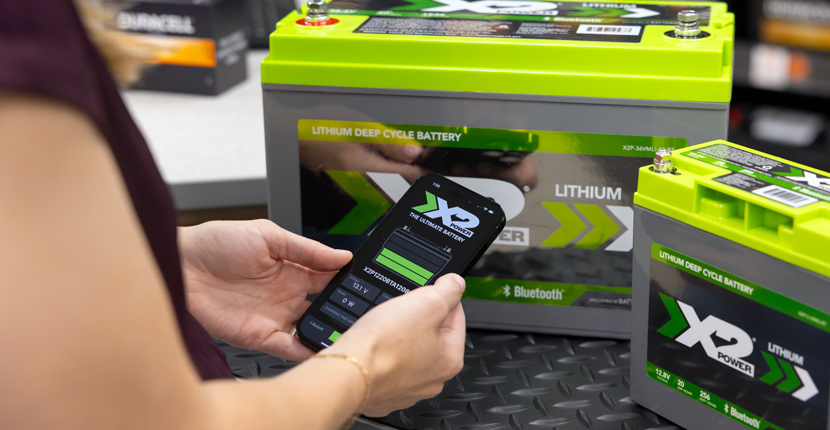What is a Battery Management System?
- by Joe Weber - updated on 10/17/2023

You've heard us mention battery management systems many times when we talk about our X2Power lithium batteries. Let's dig deeper into this important feature of many lithium batteries.
What are they? What do they do? Do all lithium batteries have one? Keep reading to learn the answers to these questions and more.
What is a BMS?
A Battery Management System (BMS) is an intelligent, integrated electronic control unit whose sole purpose is to oversee the performance of a battery and its individual cells. It is essentially the brain behind the battery. Battery management systems can offer protection against overcharging, overcurrent issues, temperature control during operation and charging, as well as other various protective features. In essence, the BMS in your X2Power LiFePO4 battery acts as a secondary safety mechanism, ensuring the utmost performance and reliability of your lithium battery.
Why is a BMS Important?
Battery management systems are vital for safeguarding the well-being and life of batteries, with an even greater emphasis on safety. It is important to operate lithium batteries within their designated parameters because of their high power output.
Ensuring these batteries operate within safe boundaries is essential to prevent potential hazards and extend the life of the battery.
What Does a Battery Management System Protect?
Battery management systems offer protections for many aspects of a lithium battery but the big three are voltage, temperature and short circuits.
Voltage Fluctuations
Damage can result from either overcharging (when cell voltage becomes excessively high) or over-discharging (when cell voltage drops too low) a lithium battery cell. The BMS effectively balances the cells and monitors for under and over-voltage scenarios to prevent damage to the battery's cells.
Temperature Control
Proper functioning lithium battery cells hinge on the operating temperature being within specific limits. Exceeding these temperatures at either extreme (too hot or too cold) can trigger potentially hazardous situations, including thermal runaway. To prevent this, the BMS monitors internal and surrounding temperature and, in cases of necessity, it may even deactivate individual cells to protect the battery.
Protection Against Short Circuits
Both internal and external short circuits pose a significant risk of triggering thermal runaway. Consequently, protecting the battery against short circuits is another critical function performed by the battery management system.
What the Heck is Thermal Runaway?
Thermal runaway, a common term heard in the battery safety world, represents a concerning domino effect that can be tricky to halt once it's in motion. It all begins when the temperature inside a battery reaches a critical level, setting off a chemical reaction within the battery's cell. This reaction generates extra heat, creating a loop that continues to raise the temperature and trigger more chemical responses, essentially becoming a self-sustaining chain reaction.
Understanding and addressing thermal runaway is vital when it comes to battery safety and is why a battery management system is so important.
Very Important Note
None of this information is presented to scare anyone. Lithium batteries are safe for numerous applications, especially lithium iron phosphate (LiFePO4) batteries that we sell here at Batteries Plus. Thanks to a recent scientific paper written by the U.S. Department of Energy's Office of Scientific and Technical Information, we know there is an incredibly low chance of this phenomenon occurring with your deep-cycle or powersport LiFePO4 batteries. Roughly around .0001%. That's extremely low and lithium, especially LiFePO4, remains one of the safest batteries around if used properly.
What Batteries Have a BMS?
Lithium batteries have many advantages over lead-acid batteries. They have a longer lifespan, are lighter, charge faster, are more efficient and more. However, lithium batteries are more sensitive than lead batteries and can be damaged if not properly cared for. Being able to have all of this power in a small package requires the battery to be very complex.
This is precisely why lithium batteries have a battery management system. So you can use the full potential of the battery while keeping the battery in safe parameters so it's safe to use and lasts a long time.
Now, it's important to note that not all lithium batteries have a BMS. Smaller lithium batteries commonly used in small electronics, like cell phones and digital cameras, may not have built-in battery management systems.
How Can Batteries Plus Help Me with My Lithium Batteries?
If you have a lithium powersport battery or lithium deep-cycle battery, we are happy to lend a hand if you have questions. Not sure if your battery is working as it's supposed to? Bring it to your nearest Batteries Plus and our battery experts will be happy to test it for you, free of charge. Visit us online or stop into a store today to learn more about our lithium battery options, especially our premium X2Power lithium batteries!